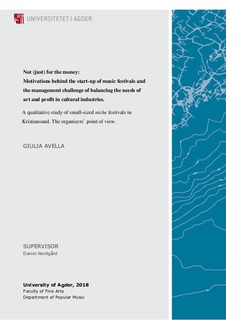Not (just) for the money: Motivations behind the start-up of music festivals and the management challenge of balancing the needs of art and profit in cultural industries : A qualitative study of small-sized niche festivals in Kristiansand. The organizers` point of view.
Master thesis
Permanent lenke
http://hdl.handle.net/11250/2564930Utgivelsesdato
2018Metadata
Vis full innførselSamlinger
Sammendrag
The background for this study is the acknowledgment, by academics, researchers and
policy makers, of the relevance of Cultural Industries and cultural content created and
distributed by them. Cultural products are indeed “complex, ambivalent and contested”,
as Hesmondhalgh affirmed: big cultural corporations tend to be motivated by profit
maximization, but simultaneously there are many cultural artefacts and organizations that
are not moved by capitalistic interests (Hesmondhalgh, 2013, p.5). However, the relation
between the artistic and idealistic and the commercial remains cause of tensions in the
field of cultural industries and many economists, sociologists and theorists have long
disputed about the state of artistic authenticity and autonomy in cultural production in the
capitalistic era.
Did cultural production lost integrity and idealism with capitalism? Or do creative
autonomy and authentic art still exist? Why do individuals get involved in cultural
activities? What role does profit have in a creative venture? These are just some of the
questions that spun around my mind when starting this research. The study was then
narrowed down to the live music industry and the focus finally moved to the exploration
of how the apparent tension “art vs commerce” is perceived and faced in small music
festivals.
The present study therefore aims at investigating (1) The nature and challenges of niche
music festivals, considering latest trends and developments in the live music sector, (2)
The reasons behind the start-up of such festivals and the role that profit play in these
events (3) The relation between art and profit, with reference to the management of small
music festivals, from the organizers` point of view.
In the approach of these questions, a qualitative methodology is used. The collection of
data is done through the conduction of in-depth interviews with informants from the
music industry, namely the creators and/or organizers behind three small-sized niche
music festivals in the city of Kristiansand.
Based on the results from the interviews, it was possible to conclude that niche festivals
present the same features as other cultural industries; they have a risky and unpredictable
nature and call for high costs. However, they cannot apply the same approaches used by
the big cultural firms to try solving the problems deriving from their nature, as they are
not as financially strong. Besides, niche festivals have also been impacted by new trends
in the live sector, as the surge in artist fees, consequent higher ticket prices and
incremented audience expectations. Moreover, what emerged clearly from this study is
that such festivals are started out by individuals with strong motivation and idealistic
driving force, and profit is not the goal of these events. Nonetheless, the festivals
acknowledge the tension between art and profit and are aware of the need of integrating
the two elements into the management of the event.
The paper concluded that no festival can be based exclusively on “love and dreams”,
although most festivals are started out of an idealistic component, the rules of economy,
must be considered. However, it is true that niche festivals are not ready to compromise
for a handful of more tickets, keeping their idealistic and artistic integrity intact.
Beskrivelse
Master's thesis Music Management MU501 - University of Agder 2018

